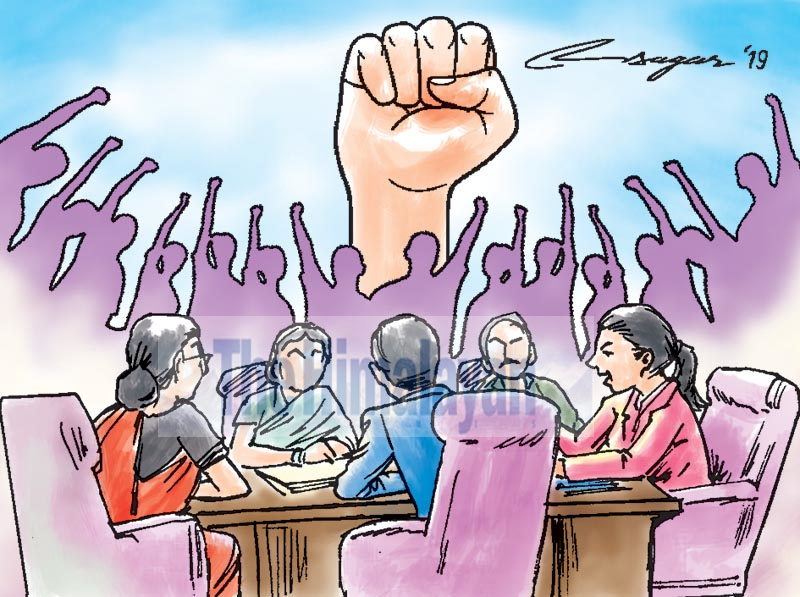10 points of efficient management, former CEO of Nepal Eye Hospital shares
Kathmandu, July 20
One of the major prerequisites that is heavily falling short for good governance in Nepal's state mechanism is the absence of proper management, be it in government or non-government organisations, or at various tiers of administration.
Policy formulation needs to be implemented through a time-bound and result-oriented action plan as its end state. In this respect, there are no reasons why any project cannot be completed or why any organisation/institution cannot be developed in time if management guidelines are strictly followed with dedication, devotion and determination, believes former CEO of Nepal Eye Hospital, Major General (Retd) Daman B Ghale.
Immediately after his retirement from the military with 37 years of active service, Ghale was asked to take on a new role as the CEO of Nepal Eye Hospital at Tripureshwar. The former Major General of Nepal Army was requested by the hospital authority to accept the leading position. When he was appointed the CEO, the hospital management needed a lot of doctoring.
The health facility, at the time of his appointment, virtually was lacking in all aspects and running with a poor financial health. For him, it was a completely new sector. But with his vast experiences in the field of management and leadership, he found himself able to cope with the new challenges and to give a new perspective to managing the crisis in due course.
With the passing of time, he was able to transform the hospital into a neat, clean, organised, financially self-sustained, and one of the best quality service provider hospitals of the country within a period of seven years. In doing so in a tactful manner, he was able to gain cooperation from his team including doctors, technical/non-technical staff, along with the executive board of the hospital.
On completion of seven years as the CEO, Ghale recently decided to take a clean break from the position and switch over to a new responsibility as one of the Board of Directors of the hospital's Executive Committee.
He believes in practical management and prescribes ten management tools, ready on his finger tips, while performing executive tasks, or delivering presentations anywhere as management experts:
- Lead by Example: A leader should be part of the team and should be able to gain the confidence of team members in any circumstance that may occur.
- Continuity: No excuse for any pause or breaking the momentum in between until the mission gets completed.
- Ownership: Remember, well-being of the institution where you belong always comes first at anytime and anywhere, your own comes afterwards.
- Patience: Things might not happen as you plan all the time, therefore, you need to be judicious and think for alternative options. One should be equipped with at least of three options before implementing the plan of action.
- Gear up from inner heart/no artificiality: There is a vast difference between actual doing and mere artificiality. What you do, should be deeply guided from the bottom of your heart and not influenced with vested interest or anything artificial.
- Team Work/Cooperation: Getting things done properly in a complex situation demands harmony and good cooperation within the group. It is not a one person show and that is where a leader should be able to synergise the strength within the team.
- Follow the Rule of the Game: A haphazard way of doing the thing will reach you nowhere which may very well lead to an accident. One needs to follow the set rules of the game from the beginning in different phases until its completion.
- Opportunity from within the Challenges: One should not get scared to face the challenges. Remember “No Risk No Gain”. It is as simple as that. Real leaders are those who can foresee and be prepared to manage the challenges in advance and finds themselves able to seek the solution.
- Honesty and Hard-work: One cannot progress if confined merely to a routine job. There needs to be an extra effort coupled with honesty in a disciplined manner. We can witness several such examples of individuals or a nation getting prosperous while performing allotted missions with honesty and hard work.
- Aptitude and Attitude: There is no doubt that better skill and positive thinking are the basic prerequisites for any task. A skill or talent can be further developed with the passing of time when it gets matured by training, exposure and experiences. But if the person’s attitude itself is negative or hostile in getting things done then there might be serious problem for the leader to bring such a mindset back on the right track. One should differentiate and deal with it tactfully, in time, before it worsens.
In a Nutshell: Above mentioned are the very few basic and practical tips of management which seem quite simple but they carry long lasting implications in getting the right outcome, says Director Ghale.
Any executive, manager, head of the department and all the front liners in a managerial platform, need to follow the basic and practical management tips adhering the bottom up approach to perform the effective lead role in an organisation and be able to encourage fellow employees working under their leadership.






